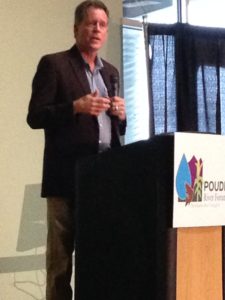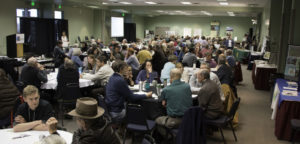The fourth annual Poudre River Forum, which took place Feb. 3, brought together users of the river to hear about and discuss its challenges and victories. This year’s Forum was held in Greeley for the first time, drawing close to 300 participants representing agricultural, municipal and environmental interests.
The Cache la Poudre River begins in the mountains west of Fort Collins and empties into the South Platte River just east of Greeley. Along its route, the river provides drinking water to more than 365,000 people, irrigates crops and lawns, and is the site of many recreational activities. The forum focuses on building collaborative relationships and understanding among the rivers’ users and those concerned about its health.
The diverse audience heard from several experts during morning sessions that centered on healthier forests and their relation to water availability and quality, a cutting-edge water budget approach to residential water billing just launched by the City of Greeley, and a State of the River ecological report card for the river as it flows through Fort Collins.
Setting sustainable limits
The Forum’s keynote address came from Brian Richter, chief water scientist for The Nature Conservancy. Richter said that communities in the West could have reliable water supplies as long as they set sustainable limits. He said ways to decide those limits include engaging in community visioning, determining water availability, meeting ecological needs, and hedging against climate change. He also advocated that Western states reduce consumption by working to increase efficiency, thus creating more water availability in cities where outdoor landscaping consumes most of the water. Agriculture can do its part too, according to Richter. He cited cases in which ag producers have conserved water by switching to drip irrigation and shifting to planting less water intensive crops. Richter, author of Chasing Water, said that water trades among rights holders could help to avoid “buy-and-dry” scenarios where cropland is dried up as water rights are transferred to municipal or other uses.
Changing water uses
Afternoon sessions included one that focused on adapting to change. Along the Poudre River, change is the result of increasing urban populations, climate variabilities, water availability and fluctuations, and changes in land use. Speakers representing an irrigation company, an environmental group and a municipality all said that they believe that, though change is inevitable, effective management and collaboration can help to manage the change that is coming.

The daylong forum concluded with a breakout session facilitated by Martin Carcasson, professor of Communications Studies and director of CSU’s Center for Public Deliberation. Carcasson asked participants to respond to questions regarding the Poudre: what they most value about it, what is most concerning to them about it, and others. Attendees then met in small groups to discuss the results, and ways citizens can further collaborate to ensure the Poudre remains a healthy, working river.
A majority of participants said that they feel positive about increasing understanding between the agricultural and environmental sectors over the past few years as a result of the annual event. The forum was organized by the Poudre Runs Through It Study/Action Work Group and the event was facilitated by the Colorado Water Institute, a unit within Colorado State University’s Office of Engagement.
For more information, photos, videos or PowerPoint presentations, click here or go to http://col.st/5VVfR.